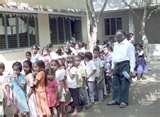Well, I touched upon some of this months and months ago, and now that kids are closer to coming home, it would be helpful to give an updated primer for friends and fam about the basics we've learned about parenting adoptive children. This is all in general terms, and only time will tell what is relevant to our two beauties. I realize I run the risk of sounding like I'm lecturing, but know that my intention is only to share with you what I would want you to teach to me if our roles were reversed. Knowing makes everything more comfortable; at least, that's how I tend to feel. And there are so many dear, dear people who've been on this journey alongside us, I want to make certain you sense our gratitude and feel a part of things in a most comfortable way.
First, the general rule of understanding the needs of the kids, and therefore, the decisions of the new parents, is that children who have lived in orphanages have learned that adults are transient and replaceable, and it can take a very, very long time for kids to learn (deeply and with trust) that parents are permanently theirs, forever.
So, what this means is it's not uncommon for adopted children to show indescriminant (false) affection to everyone, as they've been accustomed to being "everyone's child," as well as to ask strangers if he/she wants to be their mom/dad. Prior to adoption training (and before talking with lots of adoptive parents), my so-called common sense
would have led me to believe that kids acting this way must really bond quickly with people, and that they must have problems at home if they're "shopping" for parents. Of course, both of these assumptions are quite false.
That leads to the second cardinal rule (if you will) -- that the causes behind many (but not all) behaviors of adopted children may be very, very different than what one might assume based on experiences with your own birth children and the (not-adopted) kids in our classrooms or at the neighbor's house next door, for example.
In an anticipated chronology of events . . . Upon homecoming, and for many months thereafter, kids new to the family need loads and loads of calm, quiet time at home with their new parents and siblings -- not only to get to know their new family, but to drink in the sites, sounds, smells . . . all the things an infant learns while rocked and fed by a mom and dad . . . stuff that most of us probably don't consider consciously when caring for our newborns. Yet, this is so critical to security, trust, and familial identity. In short -- bonding! Attachment.
Once the family begins to invite guests into the home and venture into more social settings, there may be triggers for the children with which the parents must deal appropriately for the kids and without compromise. If a situation is too overstimulating, or reminds the child of a fearful moment from their younger days, or lacks the structure he/she still needs, the visit may have to draw to a close earlier than planned. Please, take no offense; it's likely to happen, but it's not due to your burnt meatloaf or lame jokes. (Can you feel the love?)

Grief upon grief will usually surface as the children begin to bond healthily with their family; when they begin to trust and to love genuinely their parents, they finally feel they have an emotionally safe place to release their pain. This is a very good sign of attachment and growth. But it is messy and challenging. Handled with love -- smart structure and high nurture, the children should come through with coping skills that surpass those of their age-mates. It does, however, take time, and
a lot of it.
Over the years, developmental milestones and cognitive advancement lead the children to process their losses at increasing degrees of sophistication, and their sense of identity raises challenges in cycles throughout their lives. Facilitated intuitively, these cycles can provide tremendous self-knowledge, courage, and wisdom. But it takes patience.
If you're still reading my cluvercrew blog after all these months, you've already proven your stamina.
And we thank you.
And as questions come to mind, please just ask -- open dialogue is a welcome friend. : )
(images borrowed from the internet)
















